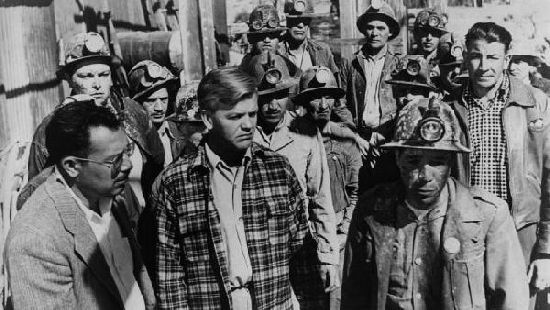Salt of the Earth (1954) 
“Banned! The film the US government didn’t want you to see!”

Director: Herbert J. Biberman
Cast: Juan Chacón, Rosaura Revueltas, Will Geer
Synopsis: At New Mexico’s Empire Zinc mine, Mexican-American workers protest the unsafe work conditions and unequal wages compared to their Anglo counterparts.
Despite its constant struggle to prevent itself from sliding into a didactic diatribe against the faceless menace of corporate management, Salt of the Earth, a collaboration between filmmakers (and some actors) blacklisted by McCarthy’s hysterical Communist witch-hunt manages to deliver effective and uplifting entertainment. The film was blacklisted by the US government when it was released, but when viewed today it doesn’t seem so controversial, and in fact much of what this Communist movie preaches — sexual and racial equality, safe working conditions, etc — have since been embraced (in theory, at least) by mainstream society.
The cast is a mixture of professional and non-professional actors, and although this disparity is evident at times, the acting is acceptable. Rosaura Revueltas, who plays the miner’s wife from whose perspective the story is told, was a successful actress in her Mexican homeland, and she gives a convincing performance as a woman slowly growing in self-confidence as the strike in which her husband and his co-workers are embroiled drags on for months. The mining company for whom he works takes a hard line approach, anxious about the knock-on effect at their other mines if they should capitulate to their workers’ demands for safer working and conditions and improved sanitation in their company homes. The boss uses the law, first to harass the picketers and then to take out an injunction preventing them from picketing. That doesn’t mean the wives can’t take their husbands’ places, however, even though many of the miners are against them doing so. The movie assumes an extra layer of complexity at this point as its focus turns to the difficulties arising from this unexpected reversal of roles (husbands complain over the clothes lines while their wives are at the mine).
Salt of the Earth is based on a real strike, and although its agenda is obvious — ‘we decided to commit a crime to fit the punishment’ one of its blacklisted makers explained — the growing closeness of the poor community in the face of increasing hardship is a universal theme. It overcomes a tiny budget and disappointing lack of imagination from director Herbert J. Biberman, to communicate its passion about the rights of the common working man, but the way in which it demonises the forces of law and big business weakens its message somewhat.
(Reviewed 15th October 2014)
httpv://www.youtube.com/watch?v=zSZq-XLxhsU
